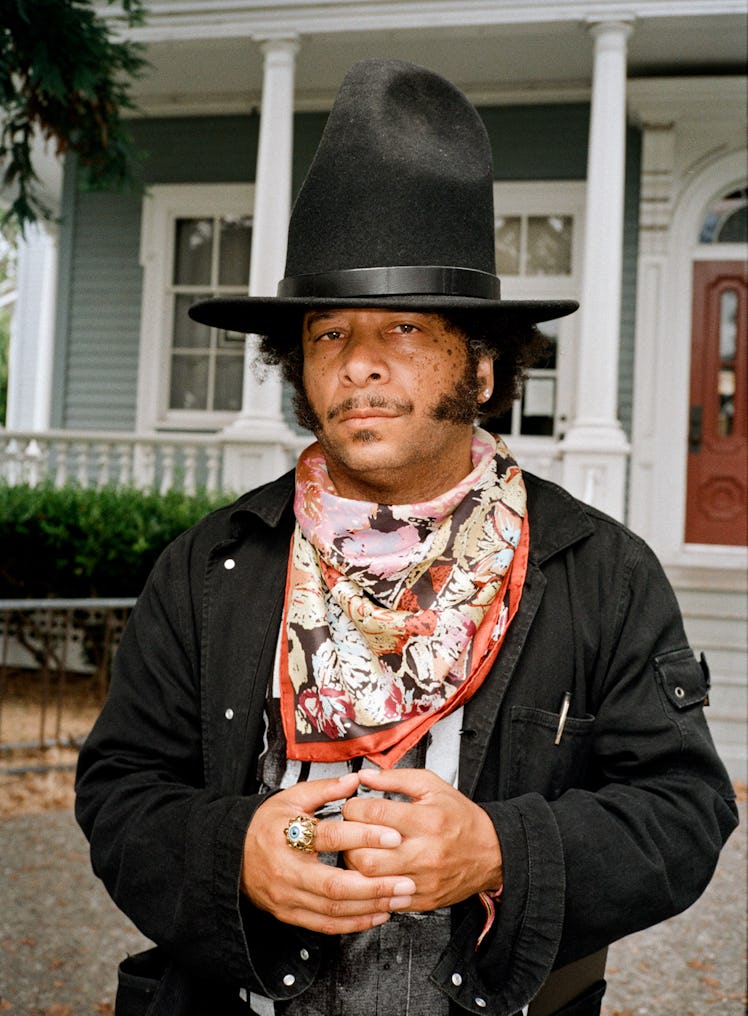Boots Riley Sees the Magic in the Mess

For W’s annual The Originals portfolio, we asked creatives—pioneers in the fields of art, music, food, dance, fashion, and more—to share their insights on staying true to themselves. See this year’s full class of creatives here.
You’re a director, producer, and screenwriter known for mind-bending films such as Sorry to Bother You and the larger-than-life series I’m a Virgo; and a musician in the political rap group the Coup. You’re also an Oakland resident, and the Bay Area has served as the backdrop for more than a few of your projects. Oakland has an inherently rebellious, antiestablishment culture. Do you feel that?
Yes, I agree with that assessment. But having toured all over the world for the past 30 years, I think that’s everywhere. Go to Tuscaloosa, Alabama, and it’s there. You go to Venice, Italy, and it’s there. People want a different world, and they want to push back against the way things are. I think the benefit and problem with being in the Bay Area is because of the ’60s and how everyone focused on what was happening here—they used that as a way to say, “That exists in this bubble right here.” We are told that we are the only ones. We end up buying the idea that there are only a few people who want change.
Who was the first person to show you that you could break the rules?
I remember when I was around 5 years old, my father came home with his torso bandaged up—his ribs were broken. We were in Detroit at the time. I asked him what happened, and he was like, “Oh, yeah, we went to fight the Klan in Chicago. Somebody sideswiped me with a two-by-four.” It was clear to me that fighting the Klan was illegal, but it was also clear to me that it was the right thing to do. So the idea of morality not being attached to the law is something that has always existed in me. The history of the Civil Rights Movement in and of itself is breaking the law. I never had this idea that all rules were there for a good reason.
Where do you find inspiration for the more surreal imagery in your work?
I’m looking for visuals that move you, that make you feel something. There are epic things happening, for instance, in Marvel movies, but they’re so smoothed out, so perfectly done. You’ve got to have other wavelengths for it to have an emotional impact. For me, messiness is a way to convey beauty—and I don’t mean the messiness that comes from when you get the set decorator to mess up the papers on the desk or whatever. I mean the messiness of not feeling quite right.
Boots Riley wears Uptown Yardie hat, his own clothing and accessories.
What is the wisest thing anyone has ever said to you about filmmaking?
After I wrote Sorry to Bother You, I didn’t think I could direct it. I tried to get Richard Ayoade, but he sent me an email saying, “No, I’m not going to do it, but I’m also not going to just refuse. I’m going to insist that you are the one who does this.” And I was like, “Well, I’ve never directed a feature before.” And he said, “Look, you have an opinion about what should be on that screen and how it should be done, and that’s very clear from what you’ve written right here. That’s all you need.” That was what convinced me.
What is the most unoriginal thing that people ask you?
“Where’d the idea come from?” There are a lot of other, more engaging ways to get to how art is born than just the story of how it started. What’s more interesting is the why.
When and where are you happiest?
For a while, I was really depressed about Prince dying—his songs made me feel so alive. But I have this book of stories about all his work—this big, thick book. It’s every single song, every single album, collecting everybody’s stories about the making of those songs. I can sit down with that book and read it, and I’m somewhat content.